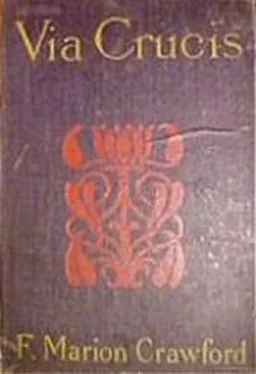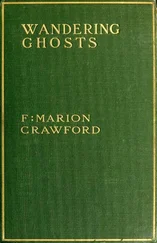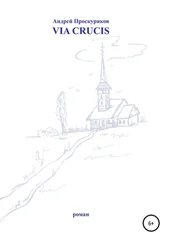F. Crawford - Via Crucis
Здесь есть возможность читать онлайн «F. Crawford - Via Crucis» весь текст электронной книги совершенно бесплатно (целиком полную версию без сокращений). В некоторых случаях можно слушать аудио, скачать через торрент в формате fb2 и присутствует краткое содержание. Жанр: Исторические приключения, на английском языке. Описание произведения, (предисловие) а так же отзывы посетителей доступны на портале библиотеки ЛибКат.
- Название:Via Crucis
- Автор:
- Жанр:
- Год:неизвестен
- ISBN:нет данных
- Рейтинг книги:3 / 5. Голосов: 1
-
Избранное:Добавить в избранное
- Отзывы:
-
Ваша оценка:
- 60
- 1
- 2
- 3
- 4
- 5
Via Crucis: краткое содержание, описание и аннотация
Предлагаем к чтению аннотацию, описание, краткое содержание или предисловие (зависит от того, что написал сам автор книги «Via Crucis»). Если вы не нашли необходимую информацию о книге — напишите в комментариях, мы постараемся отыскать её.
Via Crucis — читать онлайн бесплатно полную книгу (весь текст) целиком
Ниже представлен текст книги, разбитый по страницам. Система сохранения места последней прочитанной страницы, позволяет с удобством читать онлайн бесплатно книгу «Via Crucis», без необходимости каждый раз заново искать на чём Вы остановились. Поставьте закладку, и сможете в любой момент перейти на страницу, на которой закончили чтение.
Интервал:
Закладка:
For in his nature there was the belief of that age in something far above common desires and passions, dwelling in a temple of the soul that must be reached by steps of pain; there was the spirit of men who starved and scourged their bodies almost to death that their souls might live unspotted; and the terribly primitive conception of every passional sin as equal in importance to murder, and only less deadly than an infamous crime in the semi-worldly view of knightly honour, which admitted private vengeance as a sort of necessity of human nature.
The mere thought that he could love the Queen, or could have believed that he loved her for one instant, seemed ten thousand times worse than his boyish love of Beatrix had once seemed, when he had supposed that there was no means of setting aside the bar of affinity; and it was right that he should think so. But though temptation is not sin, he made it that, and accused himself; for it was manifest that the merest passing thrill of the blood, such as he had felt on that night in Vezelay, and now again, must be an evil thing, since it had brought about such a great result in a dangerous moment.
These were small things, and nice distinctions, that a strong man should dwell on them and bruise his heart for its wickedness. But they were not small if to neglect them meant the eternity of torture that awaited him who looked upon his neighbour's wife to covet her. There were among the nobles who had taken the Cross not a few to whom the law seemed less rigid and perdition less sure, and Eleanor herself gave her sins gentle names; but the Englishman was old-fashioned, and even the good Abbot of Sheering had been struck by his literal way of accepting all beliefs, in the manner of a past time when the world had trembled at the near certainty of the Last Judgment, expiating its misdeeds by barefooted pilgrimages to Jerusalem, and its venial faults by cruel macerations of the flesh.
Gilbert, therefore, looked upon all bodily weariness and suffering and privation which he chanced to encounter on the march as so much penance to be borne cheerfully because it should profit his soul; and while the young blood coursed in his veins, and youth's bright lights danced in his eyes, the cold spirit of the ascetic fought against the warm life toward an end which the man felt rather than saw, and of which the profound melancholy would have appalled him, could he have realized it.
As month followed month, though his strength increased upon him under much labour, and though his cheeks were tanned by sunshine and weather, the broad forehead grew whiter under his cap, and more thoughtful, and his eyes were saddened and his features more spiritual; also, while he longed daily to draw his sword and strike great blows at unbelievers for faith's sake and to the honouring of the Holy Cross, the rough fighting instinct of his people, that craved to see blood for its redness and to take the world for love of holding it, no longer awoke suddenly in him, like hunger or thirst, at the wayward call of opportunity. He could not now have plucked out steel to hew down men, as he had done on that spring morning among the flowers of the Tuscan valley, only because it was good to see the dazzling red line follow the long quick sword-stroke, and to ride weight at weight to overthrow it, swinging the death-scythe through the field of life. He wanted the cause and the end now, where once he had desired only the deed, and he had risen another step above the self that had been.
He knew it, and nevertheless, as he sat still after he had eaten his midday meal, he saw that his years had been very sad since his first great sorrow; and each time when he thought he had gone forward some strong thing had driven him back, or some great grief had fallen upon him, and he himself had almost been forced down. He had been proud of his arms and his boyish skill at Faringdon, and before his eyes his father had been foully slain; he had faced the murderer in the cause of right, and he himself had been half killed; he had believed in his mother as in heaven, and she had defiled his father's memory and robbed her son of his inheritance; he had sought peace in Rome, and had found madness and strife; he had desired to do knightly deeds and had killed men for nothing; he loved a maiden with a maiden heart, and at the touch of a faithless woman his blood rose in his throat, and for a look of hers and a tone of her voice he had put forth his hands to grapple with sudden death, forgetting the other, the better, the dearer.
So he was thinking, and the door of his tent was darkened for a moment, so that he looked up. There stood one of Queen Eleanor's attendant knights, in tunic and hose, one hand on his sword-hilt, the other holding his round cap in the act of salutation. He was a Gascon, of middle height, spare and elastic as a steel blade, dark as a Moor, with fiery eyes and thin black mustaches that stuck up like a cat's whiskers. His manner was exaggerated, and he made great gestures, but he was a true man and brave. Gilbert rose to meet him, and saw behind him a soldier carrying something small and heavy on one shoulder, steadying it with his hand.
"The Lord of Stoke?" the knight began in a tone of inquiry.
"If I had my own, sir," answered the Englishman, "but I have not. My name is Gilbert Warde."
"Sir Gilbert-" began the Gascon, bowing again and waving the hand that held his cap in a tremendous gesture, which ended on his heart as if to express thanks for the information.
"No, sir," interrupted the other. "Of those who would have given me knighthood I would not have it, and they of whom I would take it have not offered it."
"Sir," answered the knight, courteously, "those of whom you speak cannot have known you. I come from her Grace the Duchess of Gascony."
"The Duchess of, Gascony?" asked Gilbert, unaccustomed to the title.
The knight drew himself up till he seemed to be standing on his toes, and his hand left his sword-hilt to give his mustache a fierce upward twist.
"The Duchess of Gascony, sir," he repeated. "There are a few persons who call her Highness the Queen of France, doubtless without meaning to give offence."
Gilbert smiled in spite of himself, but the knight's eyes took fire instantly.
"Do you laugh at me, sir?" he asked, his hand going back to his sword, and his right foot advancing a little as if he meant to draw.
"No, sir. I crave your pardon if I smiled, admiring your Gascon loyalty."
The other was instantly pacified, smiled too, and waved his long arm several times.
"I come, then, from her Grace the Duchess," he said, insisting on the title, "to express to you her sovereign thanks for the service you did her the other day. Her Grace has been much busied by the councils, else she would have sent me sooner."
"I am most respectfully grateful for the message," answered Gilbert, rather coldly, "and I beg you, sir, to accept my appreciation of the pains you have taken to bring it to me."
"Sir, I am most wholly at your service," replied the knight, again laying his hand upon his heart. "But besides words the Duchess sends you, by my hand, a more substantial evidence of her gratitude."
He turned and took the heavy leather bag from his attendant soldier, and offered it to Gilbert, holding it out in his two hands, and coming nearer. Gilbert stepped back when he saw what it was. The money was for a deed which might have cost Beatrix her life. He felt sick at the sight of it, as if it had been as the price of blood which Judas took. His face turned very pale under his tan, and he clasped his hands together nervously.
"No," he said quickly, "no, I pray you! Not money-thanks are enough!"
The knight looked at him in surprise at first, and then incredulously, supposing that it was only a first refusal, for the sake of ceremony.
Читать дальшеИнтервал:
Закладка:
Похожие книги на «Via Crucis»
Представляем Вашему вниманию похожие книги на «Via Crucis» списком для выбора. Мы отобрали схожую по названию и смыслу литературу в надежде предоставить читателям больше вариантов отыскать новые, интересные, ещё непрочитанные произведения.
Обсуждение, отзывы о книге «Via Crucis» и просто собственные мнения читателей. Оставьте ваши комментарии, напишите, что Вы думаете о произведении, его смысле или главных героях. Укажите что конкретно понравилось, а что нет, и почему Вы так считаете.










